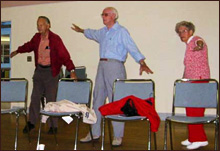
The Aging with Energy program is no longer available. We describe here the program that was provided during the CHAMPS diffusion project.
Community: Aging with Energy was offered by the Sequoia Hospital Health & Wellness Services (now the Sequoia Health & Wellness Center). The program was delivered by Sequoia staff at three community senior centers: Veterans Memorial Senior Center, San Carlos Senior Center, and Belmont Senior Center.
Recruitment: Each community senior center was responsible for recruitment. Recruitment methods varied across sites and included flyers, notices in newsletters, word of mouth, and advertisements in local newspapers and the city recreation guide. Potential participants were invited to attend an informational meeting facilitated by Sequoia staff.
Program Features:
For a diagram of the original Aging with Energy program, click here. The program features included:
- Blood pressure check
- Functional fitness testing
- Workshop series (Aging with Energy, Moving Forward: Using Your Functional Fitness Results (Part 1 and 2), Lifestyle Changes to a Healthier Heart, Balanced Eating for Life)
- Fall prevention class (lectures and exercises at Sequoia Hospital for all seniors, including those not physically able to begin Aging With Energy program; meets 1 hour per week for 4 weeks)
- In-home fall prevention and home safety program: This comprehensive program for seniors over the age of 65 was done on an individual basis and addressed all areas of fall prevention and home safety including exercise (especially balance exercises), medication use, and general health.
The original Aging with Energy program is described in detail in the following publication as part of the CHAMPS III project to diffuse physical activity programs into community settings.
- Stewart AL, Gillis D, Grossman M, Castrillo M, Pruitt L, McLellan B, and Sperber N. Diffusing a research-based physical activity promotion program for seniors into diverse communities: CHAMPS III. Preventing Chronic Disease 2006;3(2) A51. PMCID: PMC1563966